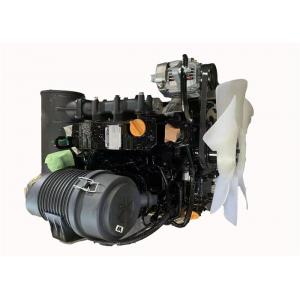3TNV82A Diesel Engine Assembly For Excavator XE15 PC30UU
Add to Cart
3TNV82A Diesel Engine Assembly For Excavator XE15 PC30UU Original New
Specification Of Diesel Engine Assembly
| Car name: | Complete Engine |
| Model Number: | 4TNV106T |
| Cylinder stroke: | 82 |
| Application: | Excavator |
| Cylinder diameter: | 84 |
| valve: | 6 vlave |
| Cooling: | Water cooling |
| Output: | 16.6kw |
| Injection: | Direction |
| Cylinders of number: | 3 |
Description Of Diesel Engine Assembly
Parts of a diesel engine
Block
The block is the backbone of the engine. It is a large block of
metal, usually aluminum or steel, with holes cut into it for the
cylinders.
Cylinders
The cylinders of an engine are where the work is done. Fuel is
injected into the cylinders, where it is ignited by squeezing the
diesel and air together making an explosion. This explosion moves
the pistons, doing work, allowing the vehicle to move forward.
Pistons
Pistons are devices that slide up and down inside the cylinders.
Their job is to slide in and out, connected to the crankshaft, in
order to compress the air injected to the chamber—this causes the
air to heat up. The volume of air that enters the chamber is
compressed about 14-25 times its original volume.
Camshaft
A camshaft is a device that manages the timing of the engine. A
camshaft's job is to regulate when fuel is let into the engine, and
when exhaust is let out. This seemingly simple job can have a great
effect on the performance of the engine.
Injectors
The purpose of a fuel injector is to atomize the fuel. This means
to turn the liquid fuel into a mist, which drastically increases
its surface area. This allows the fuel to combust more quickly,
giving greater impulse to the piston. Fuel injectors are an
improvement over carburetors because they are lower maintenance,
and atomize the fuel better. Fuel injection allows for higher
engine efficiency, which can lead to more power, and better gas
mileage.
Crankshaft
The crankshaft is the most important part of the engine because it
connects the parts together, and allows the engine to create power.
Its purpose is to turn the linear (up and down) motion of the
pistons into rotational motion. One end of the crankshaft is
attached to the camshaft, via a timing belt. The other end is
connected to the flywheel, which regulates the power coming out of
the engine, sort of like a surge protector for your computer.
Starter motor
This is one of the biggest differences between a diesel engine and
a gasoline one. Because diesel engines ignite their fuel through
compression, the starter motor must be able to cause that
compression, so the engine will begin to move. This means the
battery on a diesel-engined car must be more powerful than the one
on a gasoline-engined car.



